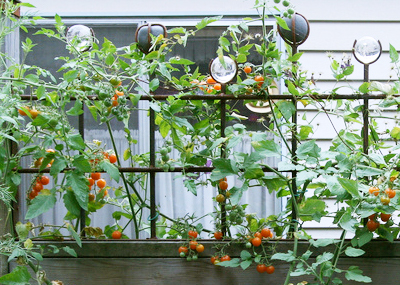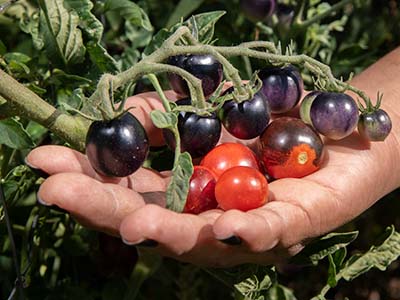Planting and caring for cherry tomatoes in your home garden

This article was posted by the University of Florida's Institute of Food and Agricultural Sciences
The spring planting window for large-fruited tomatoes can be short—after the chance of frost, but before temperatures get too high for fruit to set. However, cherry tomatoes give Florida gardeners the chance to plant and enjoy tomatoes throughout our hot summers.
There are two general shapes of cherry tomatoes; both round and elongated cherry tomatoes (sometimes called grape tomatoes) are the same plant, Solanum lycopersicum var. cerasiforme.
Characteristics
Tomatoes are the most popular vegetable for home gardens. They are fairly easy to grow and can be prepared in a variety of ways. This makes them the perfect edible for both new and experienced gardeners.
When shopping for tomato varieties you may notice that some are labeled "indeterminate" while others are "determinate." Indeterminate tomato varieties produce fruit over a period of several months, while determinate varieties produce a single crop of tomatoes.
Additionally, indeterminate varieties have a large, sprawling growth habit and require pruning and support. If space is limited, consider a determinate variety which will grow in a more compact, bush-like shape; just remember that it will only produce a single crop of tomatoes.
Varieties
The warm and often wet weather in Florida can contribute to insect and disease problems in tomatoes. It's a good idea to select varieties that are resistant to known tomato diseases, such as verticillum wilt and fusarium wilt, as well as pests like nematodes. These qualities are usually noted on the label by two- or three-letter abbreviations: R (resistant), T (tolerant), N (root knot nematode), F (Fusarium wilt), or V (Verticillium wilt).
There are quite a few varieties that might catch your eye. Choosing the right one is about finding what works for your garden and taste buds. If you're just starting out, experiment with a few different varieties. There are a number of cherry tomatoes that are particularly well-suited to Florida's unique growing climate.
'Super Sweet 100'—a hybrid closely related to the well-known 'Sweet 100' variety—is an indeterminate plant that produces sweet tomatoes well through the summer. This improved variety boasts resistance to verticilium wilt, fusarium wilt, and nematodes.
'Sweet Treats' is a vigorous indeterminate plant that produces firm, deep pink fruits that resist cracking and have an outstanding flavor. 'Sweet Treats' is resistant to fusarium wilt, cladosporium leaf mold, and tomato mosaic virus, and are somewhat resistant to fusarium crown rot and gray leaf spot.
'BHN 268' is unique among cherry tomatoes in having an exceptional shelf life. This determinate variety produces tomatoes that are firm, sweet, and flavorful. It's resistant to fusarium wilt, verticilium wilt, tobacco mosaic virus, tomato spotted wilt virus, and nematodes.
'Juliet' is known and loved for producing elongated sweet tomatoes that don't crack. The vines of this indeterminate plant grow vigorously, so be sure to give you plants room to spread up and over their tomato cages.
'Black cherry' plants produce a lovely and visually interesting deep, dark red tomato. This indeterminate vine grows quite well and will need a tall cage for support. 'Black cherry' tomatoes can provide color variety while still giving you a red, round fruit.
But tomatoes don't always need to be red; shades of yellow and orange can add something different to your garden in terms of both color and flavor.
'Yellow Pear' is an heirloom indeterminate variety and a vigorous grower, so be sure to provide support for this variety. The yellow, pear-shaped tomatoes have a mild flavor and produce wonderfully throughout the summer.
'Sun Gold' is a very sweet variety that is tangerine orange. This indeterminate variety has strong, thick vines that should be given support. For the best flavor, delay picking until the fruits reach a deep orange color. These plants are resistant to verticillium wilt, fusarium, and tobacco mosaic virus.
You may also encounter cherry tomato plant labeled "patio varieties" that are ideal for growing in a container. Varieties of patio tomatoes include 'Red Cherry', 'Sweet Chelsea', 'Sweet 100', and 'Sweet Million'.

Cherry tomatoes can add a pop of color to a wrought iron fence.
Planting and Care
Most cherry tomatoes are indeterminate and have a large, sprawling growth habit that requires pruning and support. When space is limited, many gardeners choose determinate varieties as they grow in a more compact, bush-like shape. Regardless of the variety, you should keep in mind that most tomatoes can benefit from staking or using a tomato cage to help keep fruit off of the ground.
Cherry tomatoes have the same growing requirements as larger tomatoes. They need four to six hours of sunlight per day, regular fertilization with a vegetable fertilizer, and one to two inches of water a week. Tomatoes will do best when they receive a heavy soaking of water once a week as opposed to frequent, light sprinklings.
When growing tomatoes in a container, be sure to choose one large enough and use a rich, well-drained potting media. A five-gallon bucket with holes drilled in the bottom is an easy and affordable option that will be large enough to prevent the soil from drying out.









































